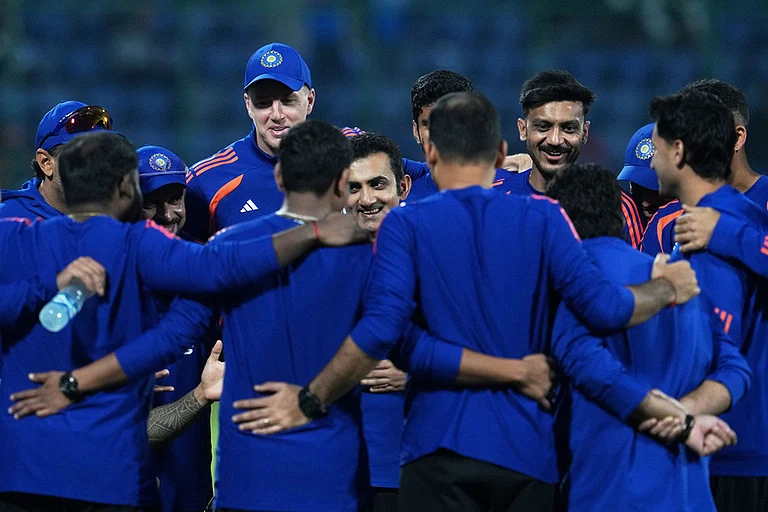Congress leader Ajay Maken has come out in opposition to Delhi Chief Minister and Aam Aadmi Party (AAP) supremo Arvind Kejriwal over the ordinance issue.
Maken has said that supporting Kejriwal in opposition to the Centre's ordinance over the control of services in Delhi is going against the wisdom of BR Ambedkar and Pandit Jawaharlal Nehru.
Maken's comment comes as Kejriwal is on a nationwide mission to garner support against the ordinance. He met West Bengal Chief Minister and Trinamool Congress (TMC) supremo Mamata Banerjee on Tuesday. Mamata assured Kejriwal her support over the ordinance issue.
In a lenghty Twitter post, Maken listed administrative, political, and legal reasons of not supporting Kejriwal's position on the ordinance.
Maken began his Twitter post by invoking Ambedkar, Nehru, and other iconic Indian leaders over the decades.
He said, "First, by backing Kejriwal, we are going against the decisions and wisdom of numerous respected leaders: Baba Sahib Ambedkar on 21st October 1947, Pandit Nehru and Sardar Patel in 1951, another decision of Pt Nehru in 1956, Lal Bahadur Shastri Ji as Home Minister in 1964 and as Prime Minister in 1965, and Sh. Narasimha Rao in 1991."
Maken then said that the cooperative federalism principle does not apply to Delhi as it's not merely a state or a Union Territory (UT) but national capital and, this way, it belongs to the Union.
Citing Ambedkar, Maken said, "When addressing the complex issue of governance in Delhi, a committee led by Baba Sahib Ambedkar submitted its report on October 21, 1947. With particular reference to Delhi, the report states: 'So far as Delhi is concerned, it seems to us that as the Capital of India it can hardly be placed under a local administration. In the United States, Congress exercises exclusive legislative power in respect of the seat of the Government; so too in Australia. No sufficient reasons for departing from these precedents appear in the Committee’s report. We have, therefore, come to the conclusion that a somewhat different plan is desirable. Accordingly, we have proposed in the draft that these Central areas may be administered by the Government of India either through a Chief Commissioner or a Lieutenant-Governor or through the Governor or the ruler of a neighbouring State'."
Notably, Delhi was placed in Part C states upon the implementation of the Constitution in 1950. At the time, there were four types of states. Parts A and B states were full-fledged states which were either British provinces or princely states. Part C states were centrally administered areas, including Delhi.
"Part C states consisted of erstwhile chief commissioner's provinces of British India and some parts of erstwhile princely states. These Part C states (in all 10 in number) were centrally administered," notes M Laxmikanth in his book Indian Polity.
In 1991, said Maken, former and late Prime Minister Narasimha Rao gave powers of Delhi to the Lieutenant Governor.
He said, "In 1991, Narasimha Rao Ji established the present form of Governance for Delhi, granting LG all powers to transfer and post officers via the ‘Transaction of Business Rules’. So, none of the Prime Ministers since independence allowed the elected Delhi Government the powers to transfer and post officials."
Maken then goes on to list a series of political objections to not support Kejriwal.
Maken said that while AAP and Kejriwal seek the support of Congress, their actions so far have been contrary to the interests and positions of Congress.
Maken claims AAP and Kejriwal took the following actions that went against the interests of Congress:
- AAP along with the BJP passed a resolution requesting the Union government to withdraw Bharat Ratna from Rajiv Gandhi
- Kejriwal backed the BJP both inside and outside of Parliament on the Jammu and Kashmir issue.
- Kejriwal also supported the BJP during the move to impeach CJI Dipak Mishra
- Kejriwal was the first to implement the controversial anti-farmer Laws.
- AAP opposed the Opposition's candidate for the Rajya Sabha Deputy Chairperson and instead supported the BJP-sponsored candidate.
- Kejriwal's supported the BJP in Gujarat, Goa, Himachal, Assam, Uttarakhand, and in the recent Karnataka elections, where he fielded candidates against Congress.
Then, Maken went on the point out a legal reaons to oppose Kejriwal's stand on the ordinance issue.
He wrote, "Para 95 of a recent Supreme Court decision allows the Union Government to modify the law. It states, 'However, if Parliament enacts a law granting executive power on any subject within the domain of NCTD, the executive power of the Lieutenant Governor shall be modified to the extent, as provided in that law'."
Concluding his post, Maken wondered if Kejriwal's stand is just "political posturing".
"The key question remains - if all the previous Delhi Chief Ministers could perform their roles without fuss, why is Kejriwal stirring up chaos now? Is this mere political posturing? Unfortunately, it's Delhi that bears the brunt of this unrest. In this turmoil, Delhi suffers the most," said Maken.


























